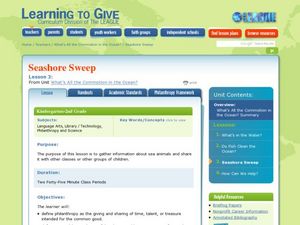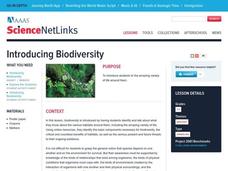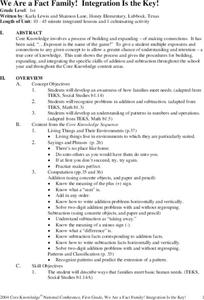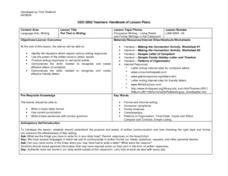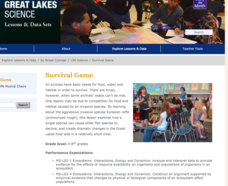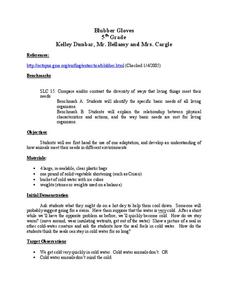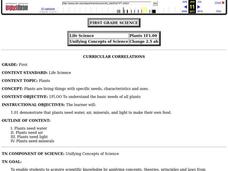Curated OER
Pollen & Pollination
Learners identify the different ways things are pollinated and how to manage pollen. In this pollination lesson students complete an experiment on how moths pollinate flowers.
Curated OER
Algae Experiments
Students describe the characteristics of algae. In this biology lesson, students perform a series of experiment to explore algae. They investigate the basic things algae need to survive.
Curated OER
Prairies
Students identify the basic characteristics of the prairie ecosystem, and several commonly known prairie species. They create a classroom mural of a prairie ecosystem; and create reports about what they have found out.
Curated OER
Strawberry DNA extraction
Students study the basic function of DNA and then extract it from strawberries. In this DNA extraction lesson students examine DNA and see why the extraction of it is so important to scientists.
Curated OER
Seashore Sweep
Young scholars gather information about sea animals. For this ocean lesson, students read a story about the ocean and seashore. They discuss the needs of seashore animals and create a Mystery Ocean Animal riddle book. Young scholars...
Curated OER
A Day in a Life of an Arctic/Antarctic Animal
Learners, through video segments, explore what types of animals live in the Arctic and Antarctica. They also clear up any misconceptions they have about penguins or polar bears.
Curated OER
Costs of Providing for animals
Students explore the necessary costs of animals shelters and taking care of one pet. For this providing for animals lesson, students calculate the costs of keeping a pet. Students understand the need for outside funding for animal shelters.
Curated OER
Growth and Changes in Plants
Students investigate the growth and changes in plants. They view a video and discuss the changes in plants. They work in small groups to demonstrate vocabulary words to the class. They visit a green house and take pictures of plants to...
Curated OER
Introducing Biodiversity
Students are introduced to the life around them. As a class, they discuss their prior knowledge about the habitats in their local area. Using the internet, they identify the basic components needed for biodiversity and the major...
Curated OER
Fish Haunts
Students examine some of the different ecosystems that fish live in. While doing this they identify the species of fish and the ecological conditions needed for survival. Students use research resources to make fish cards that have...
Curated OER
Plants and Animals Depend Upon One Another
First graders study plants and animals and how they depend on one another. They also study that plants give energy to animals and provide oxygen needed for life. Finally, 1st graders give examples of the roles plants and animals play...
Curated OER
We Are a Fact Family! Integration Is the Key!
Students practice addition and subtraction. In this fact families unit, students practice finding sums and differences for fact families. This unit includes ten lessons with science and social studies integration.
Curated OER
Inuit Culture: The Family
Students examine the attributes of Inuit families. In this cultural practices instructional activity, students read "Saqiyuq: Stories for the Lives of Three Inuit Women," and respond to 10 comprehension and critical thinking questions...
Curated OER
Discovering Owls
Students are introduced to different types of owls and owl pellets. They list several adaptations that benefit the owls. Students identify the various species of owl that live in Wisconsin. Students discuss owl pellets and identify the...
Curated OER
Sorting
Young scholars study how things are stored and how information is retrieved. In this investigative lesson students play a game that helps them to see how things are sorted in a library.
Curated OER
The "Laws" of Setting Goals
In this setting goals worksheet, learners list things they want to accomplish, pick one and plan how to achieve it and deal with setbacks.
Curated OER
Put That in Writing
High schoolers identify life situations which require various writing responses, use the power of the written word to obtain results, practice writing responses to real-world events, and demonstrate the skills needed to recognize and...
Curated OER
Anger Management
Eighth graders are introduced to how to manage their anger. As a class, they identify what anger is and why people get angry. In groups, they discuss the effect of anger on one's everyday lives and discuss how to deal with it properly.
Curated OER
FACS:Nanotechnology and "Smart" Textiles (IT)
Students research and define nanotechnology and how nanotechnology products are being used in the development of new textiles for different industries. They demonstrate basic flaws found in the clothing industry today: shrink, fade,...
Maine Content Literacy Project
Exploring Text with the iMovie Application
Get your class going on one of the final assessments for a unit on short stories by introducing iMovie and its main features. In this tenth lesson in a series of fourteen, pupils take some time to explore iMovie before conducting an...
Michigan Sea Grant
Survival Game
Musical chairs may be a classic game, but Ruffe Musical Chairs is a unique lesson on invasive species! Using the time-honored game, pupils role play the behaviors of the invasive fish called Eurasian ruffe. Learning about this aggressive...
Curated OER
The Water We Drink
Third graders relate that the quality of their drinking water is subject to the condition of the environment and water found in streams and creeks in their community. They track the travel of a wad of paper from a student's desk to a...
Curated OER
Blubber Gloves
Fifth graders examine animal adaptations and how they meet their needs in a variety of environments. They discuss how they might adapt to their own environment before discussing how an animal could adapt. Next, they complete an...
Curated OER
Plants
First graders explore the specific needs, characteristics, and uses of plants. They discuss the needs of plants as they grow. Students observe plants in various settings as they grow and note the changes they see.






